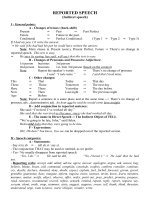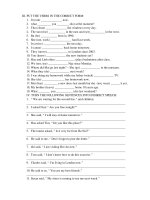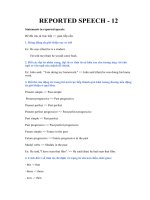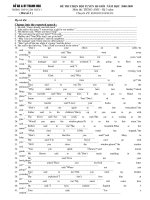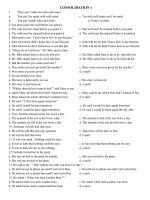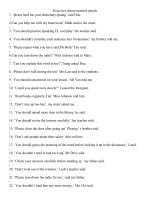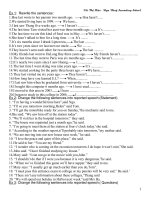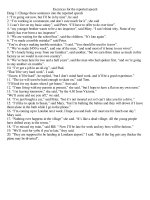Reported Speech
Bạn đang xem bản rút gọn của tài liệu. Xem và tải ngay bản đầy đủ của tài liệu tại đây (109.51 KB, 3 trang )
REPORTED SPEECH
(Indirect speech)
I - General points:
A - Changes of tenses: (back-shift)
Present ⇒ Past ⇒ Past Perfect
Future ⇒ Future in the past.
Conditional ⇒ Perfect Conditional: (Type 1 ⇒ Type 2 ⇒ Type 3)
If I had my pen, I’d write the answer.
⇒ He said if he had had his pen he could have written the answer.
Note: Main clause in Present (cont.), Present Perfect, Future ⇒ There’s no change in
reported speech. This text is easy.
⇒ He says (is saying, has said, will say) that this text is easy.
B - Changes of Pronouns and Possessive Adjectives:
1st person becomes 3rd person
2nd person becomes 1st, 2nd, 3rd person (based on the context)
Note: Report the speaker’s words ⇒ There’s no change of pronoun
I said: “I take mine.” ⇒ I said that I took mine.
C - Other changes:
This ⇒ That Today ⇒ That day
These ⇒ Those Tomorrow ⇒ The next day
Here ⇒ There Yesterday ⇒ The day before
Now ⇒ Then Last night ⇒ The previous night
Ago ⇒ Before
Note: Report a sentence in a same place and at the same time --> There’s no change of
pronoun, adv., demonstrative adj. An hour ago he said he would come here tonight.
D - Add conjunction in reported sentence:
She said: “I’m tired. I’ve worked all day.”
She said that she was tired as (because, since) she had worked all day.
E - The name in Direct Speech ⇒ The Indirect Object of TELL
“We’re going to be late, John,” said Helen.
Helen told John that they were going to be late.
F - Expressions:
Oh!, Oh dear! You know, You see can be dropped out of the reported version.
II - Speech categories:
A - Statements:
- Say st to sb ⇒ tell sb st / say st.
- The conjunction THAT may be used or omitted, as we prefer.
- Yes / No usually disappear from reported speech.
“Yes, I do.” ⇒ He said he did. “No, I haven’t.” ⇒ He said that he had
not.
- Reporting verbs: accept, add, admit, advise, agree, answer, apologize, argue, ask, assure, beg,
believe, blame, boast, call, command, complain, conclude, confess, confirm, consider, continue,
cry, decide, declare, demand, deny, doubt, expect, explain, feel, forbid, forecast, groan, growl,
grumble, guarantee, hear, imagine, inform, inquire, insist, instruct, invite, know, learn, mention,
murmur, mutter, notify, object, observe, offer, order, point out, pray, predict, promise, propose,
read, reassure, recommend, record, refuse, remark, remind, repeat, reply, report, request, say,
scream, shout, smile, snap, stammer, state, suggest, suppose, swear, tell, thank, think, threaten,
understand, urge, want to know, warn, whisper, wonder, write.
+ refuse, agree, promise, threaten + to infinitive.
+ advise, invite, recommend, remind, warn + O + THAT clause / to infinitive
+ apologize for, complain about, confess to, insist on, object to + Gerund.
Note: In direct speech, S & V invert (name only, not pronoun)
“Nice to see you,” Phil said / said Phil (but he said not said he)
B - Questions.
- Say, say to + O ⇒ Reporting verbs: ask, inquire, wonder, want to know....
- THAT is not used.
- Yes / No questions ⇒ use conjunction IF / WHETHER in reported version.
“Are you a student?” ⇒ He asked her if / whether she was a student.
- WH- questions ⇒ WH-element becomes the conjunction.
“Where do you live?” ⇒ He asked me where I lived.
C - Orders, requests, advises.
- Say ⇒ tell, ask, order (according to the circumstances and common sense)
- No Conjunction is used.
- Verb in direct speech ⇒ To-infinitive in indirect speech.
“Go out.” ⇒ He told me to go out.
- Negative Verb ⇒ Not to -infinitive.
“Don’t get there.” ⇒ He told me not to get there.
- Reporting verbs: advise, ask, beg, command, encourage, entreat, forbid, implore, invite,
order, recommend, remind, request, tell, urge, warn, suggest…
- Let’s ⇒ suggest + should / might. “Let’s have a break,” she said.
She suggested that they should (might) have a break.
- Requests: “Will you lend me a pound?” “Would you lend me a pound?”
“Would you mind lending me a pound?”... These may be reported in 2 ways:
As a request: He asked her to lend him a pound.
As a question: He asked her if she would lend / mind lending him a pound.
D - Exclamations:
- Various constructions are possible. According to the context, we must choose the right verbs and
adverb to express the meaning of the sentence.
“Thank you!”
“Welcome!”
“Happy new year!”
“Congratulation!”
“Liar!”
“Damn!”
“How pleasant! You come here.”
“What a pity! I have no money.”
“I’m sorry! I have no money.”
“I’m sure we’ll never meet again!”
“Bad mark again!”
He thanked her truly / sarcastically.
He welcomed them wholeheartedly / coldly.
She wished me a happy new year.
They congratulated him cheerfully / bitterly.
She called him a liar indignantly /angrily.
He swore roughly.
She cried joyfully (with joy, delightedly...) that he came....
She said sadly (With deep sadness, sorrowfully...) that she had no
money.
She said regretfully that they hardly meet again.
He said with bitterness (depressedly...) when he got bad mark again.
E - Mixed types.
Direct speech may consist of statement + question, question + command, command +
statement... or all together. Normally each requires its own introductory verb, or add an appropriate
conjunction or use a participle.
“I don’t know her. Do you?” he asked.
⇒ He said he did not know her and asked me if I did (if I knew her)
“You’d better take this umbrella as it was raining outside.”
⇒ She advised him to take that umbrella as it was raining out side.
“Please, don’t drink too much! Remember that you’ll have to drive home.”
⇒ She begged him not to drink too much, reminding him that he would have to drive
home.
